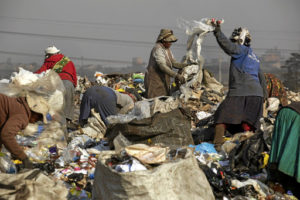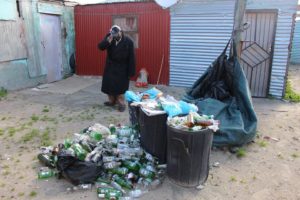Waste Pickers: Our livelihood is on lockdown!
By Nomacebo Mbayo

Waste pickers sorting through garbage for recycling at a dumpsite in Sasolburg, South Africa. (Photo by Jonathan Torgovnik/Getty Images)
Waste Pickers, known as re-claimers are a group across the country making a living out of recycling and waste collection. Salvaging reusable or recyclable materials thrown away by others for reuse or sometimes for personal consumption they have been playing a big role in reducing waste in our land fields. According to research, waste pickers are key to SA’s economy and they collect up to 80% of post consumer packaging.
The lockdown due to COVID-19 has been difficult times for waste pickers across the country. Most waste pickers depend on day to day payments from their sales but mostly because they are at risk of getting the virus while at work since they will be exposed to waste. This situation meant no work no pay during the lockdown since they are self employed and are sustaining themselves and decreasing the rate of unemployment.
 “We had to stay at home with nothing to eat or feed our families because we were still waiting for the middleman to come and collect our recyclables, some were waiting for payment for goods they sold the previous month” said Nompumelelo Njana coordinator of the Waste Pickers Western Cape currently serving in the national leadership of the South African Waste Pickers Association.
“We had to stay at home with nothing to eat or feed our families because we were still waiting for the middleman to come and collect our recyclables, some were waiting for payment for goods they sold the previous month” said Nompumelelo Njana coordinator of the Waste Pickers Western Cape currently serving in the national leadership of the South African Waste Pickers Association.
The waste pickers have always expressed the concerns around being marginalised as workers even in these hard times not being able to go out to work on the streets or in the land field and no attention was given to them. In some parts of the country waste pickers were supported with food parcels, while waste pickers from the Western Cape have not been given any attention at all.
Level 4 of the lockdown raised hope for waste pickers thinking this could be a possibility of going back to work. Unfortunately the lockdown continues and life is becoming more and more difficult for waste pickers. “The most scary part about the work that we do is that all the COVID-19 waste ends up in the bin or the landfill which makes us the most vulnerable group in these hard times” said Nompumelelo.


